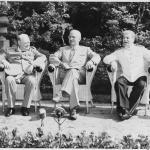For me, the first of May always feels like the changing of a season– perhaps because so much of my life has been lived and continues to be lived by the academic calendar. But even for those not living around school schedules, the transition of spring into summer seems to be significant. Maybe it’s just the nicer weather, or the growth of gardens, or the promise of time with friends and loved ones, but it seems that as summer begins, culturally, the message seems to be that it’s time for a season of happiness.
But what about those who may not feel joyful, or for whom May holds difficult anniversaries, or those who are grieving? When one doesn’t feel the promise of summer sunshine holds much hope or joy, what can one hold onto? When giving a benediction to graduating seniors a few weeks ago, I was thinking about some of these transitions and changes, and about how to weather the changing of seasons when things are bright and hope-filled as well as when things seem bleak and grief-filled. What could provide grounding and certainty in the big change these seniors are entering, passing from spring into summer and from undergraduate into their careers and lives? What can I hold onto in seasons of transition, both ones that hold joy and ones that hold grief? What can I say to friends who are struggling to see God’s goodness in the midst of tragedy, or to loved ones overwhelmed by the goodness and hope of new opportunities?
A few passages by one of my favorite theologians, the fourteenth-century anchoress Julian of Norwich, kept coming to mind. In one of her well-known showings or revelations, God’s reassures Julian that, despite sin and brokenness, “all shall be well, and all shall be well, and all manner of thing shall be well.” (Julian of Norwich, Revelations of Divine Love, Ch. 27) This certainly provides us with comfort in the changing of the seasons: despite sin, despite brokenness, despite suffering, God promises that all will be made well. But sometimes that reassurance feels difficult to cling to, particularly in the face of great tragedy and loss when we can’t see a way for things to be made well. In those moments, I find this second passage from Julian a helpful reminder of things that we can know to be true, even in the midst of change:
In this same time our Lord showed me a vision of his love. I saw that He is to us everything that is good and comfortable for us: He is our clothing that for love wraps us, clasps us, and all encloses us for tender love, that He may never leave us; being to us all things that are good. Also in this He showed me a little thing, the size of a hazelnut, in the palm of his hand; and it was as round as a ball. I looked upon it and thought what may this be? And the Lord answered me: “it is all that is made.” I marvelled how it might last, for I thought it might have fallen to nothingness because of its littleness. And I was answered: ‘It lasts, and ever shall last, because God loves it’. And so all things have being by the love of God. In this little thing I saw three properties: the first is that God made it, the second is that God loves it, and the third, that God keeps it. (Julian of Norwich, Revelations, Ch. 5)
In her “Showings,” Julian wrestles with some of the same questions that we often grapple with in times of change and transition: the nature and power of God, the problem of suffering and evil, the question of true belief, the beauty and fullness of Christ’s incarnation and passion, and how we live in light of who God is and what He has done for us. This passage, one of the best-known passages from her text, points us towards three truths that we can hold on to in the midst of any season, joyful or sorrowful: that God is our creator, that God loves us, and that God sustains us.
My prayer for those of us facing new seasons and all they hold is this: that we remember who God is, what Christ has done for us, and what that means for our lives. As we experience the fullness of life, with its joys, sorrows, and challenges, I pray that we never forget that we are created, we are loved, and we are sustained by the mercy and love of our God. And I pray that as we rest secure in these truths, like Julian, we continue to ask the hard questions of God and of each other. May we never stop seeking after God, seeking after truth, and seeking to learn and grow in the gifts and abilities we have been given. We can ask these questions with confidence and persevere through the ups and downs of life, because we know who God is: that God has made us, that God loves us, and that God sustains us, even in our littleness. May we all head into this new season–whatever it holds for us– echoing the prayer with which Julian closes this discussion of God’s sustenance of us: “God, in your goodness, give us yourself, for you are enough for us, and we ask for nothing that is less than full worship to you; if we ask anything that is less, we will remaining wanting– but in you we have all.” Amen.













